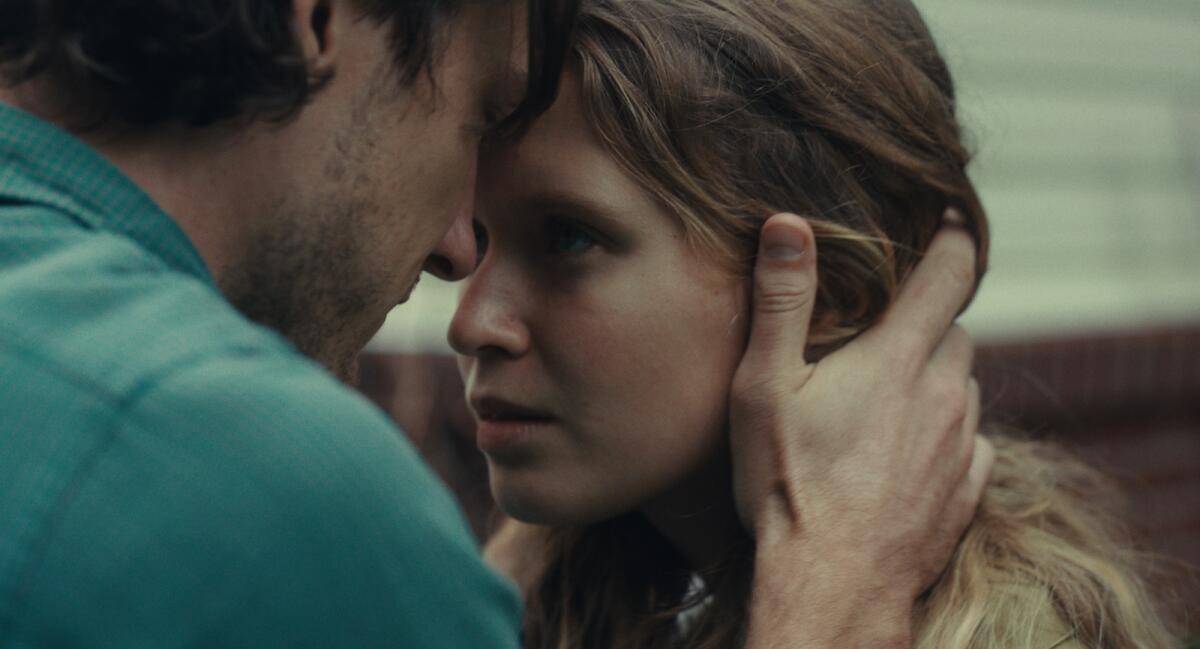Review: ‘The Starling Girl’ explores female desire and self-expression in a tightknit church

- Share via
One of the greatest tools that authoritarian religious groups have to control congregants — especially women — is convincing them that their personality, their power, is a liability. Sowing doubt in one’s agency has always been an insidiously formidable weapon.
In writer/director Laurel Parmet’s impressively nervy feature debut “The Starling Girl,” a devout 17-year-old in a fundamentalist Christian community begins to notice the divide between her increasingly bold sense of self and the well-policed demands of her insular, tightknit church, a quiet struggle made even more pronounced with the sudden kindling of desire.
An obliging daughter, helpful sister to her younger sibs and joyful member of her church’s troupe of “worship dancing” young women, Jem Starling (Eliza Scanlen) lives to glorify God, and, equally, loves to show it through dance. It’s a fragile happiness, though, when after the high of a performance she’s scolded for her sin-adjacent dancewear (a not-thick-enough dress top), and immediately needs to find some privacy so she can flush out some tears. Which in Scanlen’s scintillatingly layered portrayal are a tangy, foreshadowing mix of devotional guilt and hurt feelings. When vanity is the catch-all accusation in her circle for the blasphemy of pleasure, what’s a naturally self-expressive person to do?
Further conveying how her autonomy — bodily or mentally — is off the table, Jem’s parents Heidi (Wrenn Schmidt), a watchful figure, and Paul (Jimmi Simpson), a loving father and not-so-secret alcoholic, start pushing a courtship-to-marriage track for her with the head pastor’s shy, painfully awkward son Ben (Austin Abrams). But the reality roiling inside their eldest daughter is that her sexual stirrings, when she’s not trying to pray them away, have a thornier focus: Ben’s older, married brother Owen (Lewis Pullman), a soft-spoken, charismatic brooder who runs the church’s youth programs, and has his own fraught relationship with the strictures of his surroundings.
Glenn Howerton and Jay Baruchel deliver standout performances in Matt Johnson’s mockumentary-influenced technological thriller.
The intimacy that follows isn’t difficult to predict — Jem and Owen are not only kindred soul-hostages feeling out a rebellious connection, but also one’s a teenager acting on overpowering feelings and the other is an adult with a measure of power who should know better. Yet how it plays out in Parmet’s emotionally mindful scenario doesn’t hew so neatly to any simple morality of abuse and victimhood one might be tempted to view it through.
Because we’re seeing everything through Jem’s eyes — cinematographer Brian Lannin creating an almost vérité-documentary rigor on that front — patriarchy’s sinister hold feels ever-present, and Scanlen is excellent at the minute-to-minute thrill and agony of a situation that’s educating her fast in human frailty. But Owen is no less fascinating, Pullman’s sharp turn pinned to where dissatisfaction leads the weak-willed (which could also be applied to Jem’s dad, and Simpson’s ultrafine portrayal of a wrecked born-again addicted to the fumes of his old life).
We’ve come to expect a visually eerie serenity from stories set in cloistered worlds of punishing piety (think “Martha Marcy May Marlene” and “Midsommar”). But Parmet’s less interested in cultish dread than a more naturalistic dullness of isolation and groupthink you’d find in any closed conservative society where women of faith have been sold a purity narrative. It’s a vibe captured well in the edgy, dead-eyed propriety in Schmidt’s portrayal of Jem’s mother, but also in the troupe dancers who casually police Jem’s choreography suggestions.
“The Starling Girl” doesn’t always hold our attention, mainly due to an occasionally shaggy pace that forgets we’re often ahead of the plot. There are also two endings: one built on a choice of Jem’s that’s incredibly stirring and naturally tense, but then a subsequent scene with music and dance that reads more like something scripted to be a meaningful bookend. And yet there’s a generous reading of so on-the-nose a grace note if we see it as Parmet’s scene, too, as much as Jem’s: a female filmmaker no longer running alongside her anguished creation yearning to escape, but finally giving her something of her own, a chance to reconcile all she’s ever known, who she knows she is, and what might lie ahead.
'The Starling Girl'
Rated: R, for some sexuality
Running time: 1 hour, 56 minutes
Playing: Starts May 12, AMC Century City
More to Read
Only good movies
Get the Indie Focus newsletter, Mark Olsen's weekly guide to the world of cinema.
You may occasionally receive promotional content from the Los Angeles Times.











